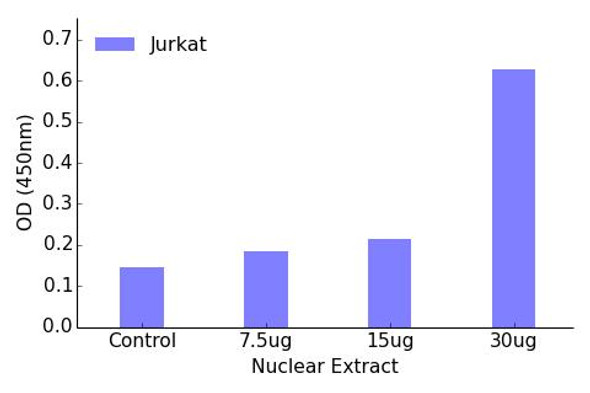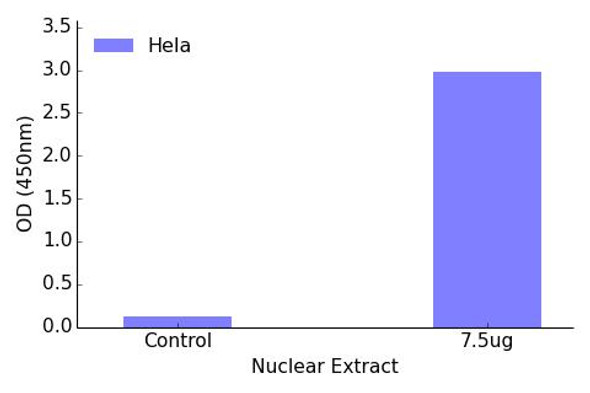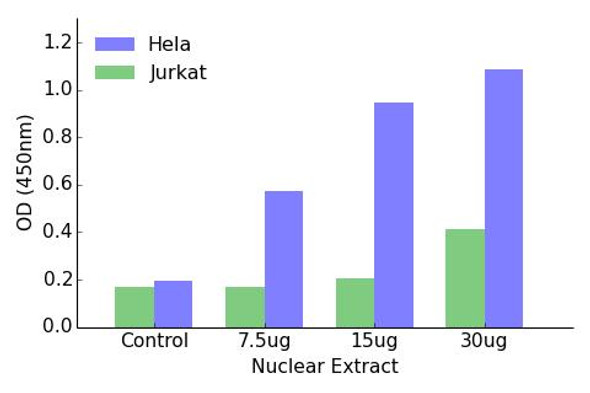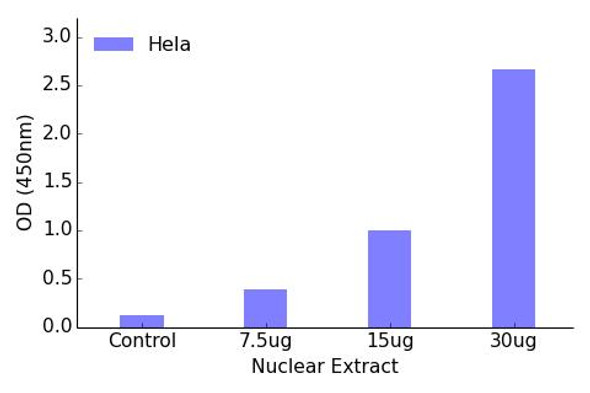Description
HOXD10 Transcription Factor Activity Assay
The HOXD10 Transcription Factor Activity Assay Kit is a powerful tool for researchers studying the role of the HOXD10 transcription factor in gene regulation. This kit allows for the precise measurement of HOXD10 activity in cell lysates, providing valuable insights into its function in various biological processes.HOXD10 is known to play a key role in development, differentiation, and disease progression, making it a valuable target for therapeutic interventions. By utilizing this assay kit, researchers can accurately assess HOXD10 activity levels and further explore its potential as a therapeutic target for conditions such as cancer, developmental disorders, and autoimmune diseases.
With its high sensitivity and specificity, the HOXD10 Transcription Factor Activity Assay Kit offers reliable and reproducible results, making it an essential tool for any research focused on understanding the molecular mechanisms underlying gene regulation and disease pathogenesis.
| Product Name: | HOXD10 Transcription Factor Activity Assay |
| Product Code: | TFAB00125 |
| Target: | HOXD10 |
| Synonyms: | Homeobox protein Hox-4D, Homeobox protein Hox-4E |
| Reactivity: | Human, Mouse, Rat |
| Sample Types: | Nuclear or cell lysates |
The Assay Genie HOXD10 transcription factor activity assay allows for the detection and qualitative analysis of endogenous levels of activated transcription factors in a variety of nuclear and cell lysates
Assay Genie ELISA kits are designed to significantly reduce experiment time and ensure sensitivity and flexibility for high-throughput screening.
| Assay Time: | 4.5 hours |
| Detection Method: | Colorimetric 450 nm |
| Size: | 12 x 8-Well Microstrips |
| Storage: | 4°C for 6 months |
| UniProt Protein Function: | HOXD10: Sequence-specific transcription factor which is part of a developmental regulatory system that provides cells with specific positional identities on the anterior-posterior axis. Defects in HOXD10 are a cause of congenital vertical talus (CVT); also known as rocker-bottom foot deformity or congenital convex pes valgus. CVT is a dislocation of the talonavicular joint, with rigid dorsal dislocation of the navicular over the neck of the talus. This condition is usually associated with multiple other congenital deformities and only rarely is an isolated deformity. Belongs to the Abd-B homeobox family. |
| UniProt Protein Details: | Protein type:DNA-binding Chromosomal Location of Human Ortholog: 2q31.1 Disease: Vertical Talus, Congenital |
| NCBI Summary: | This gene is a member of the Abd-B homeobox family and encodes a protein with a homeobox DNA-binding domain. It is included in a cluster of homeobox D genes located on chromosome 2. The encoded nuclear protein functions as a sequence-specific transcription factor that is expressed in the developing limb buds and is involved in differentiation and limb development. Mutations in this gene have been associated with Wilm's tumor and congenital vertical talus (also known as "rocker-bottom foot" deformity or congenital convex pes valgus) and/or a foot deformity resembling that seen in Charcot-Marie-Tooth disease. [provided by RefSeq, Jul 2008] |
| UniProt Code: | P28358 |
| NCBI GenInfo Identifier: | 143811403 |
| NCBI Gene ID: | 3236 |
| NCBI Accession: | P28358.2 |
| UniProt Secondary Accession: | P28358,Q6NT10, |
| UniProt Related Accession: | P28358 |
| Molecular Weight: | 38,411 Da |
| NCBI Full Name: | Homeobox protein Hox-D10 |
| NCBI Synonym Full Names: | homeobox D10 |
| NCBI Official Symbol: | HOXD10 |
| NCBI Official Synonym Symbols: | HOX4; HOX4D; HOX4E; Hox-4.4 |
| NCBI Protein Information: | homeobox protein Hox-D10 |
| UniProt Protein Name: | Homeobox protein Hox-D10 |
| UniProt Synonym Protein Names: | Homeobox protein Hox-4D; Homeobox protein Hox-4E |
| Protein Family: | Homeobox protein |
| UniProt Gene Name: | HOXD10 |
| UniProt Entry Name: | HXD10_HUMAN |






